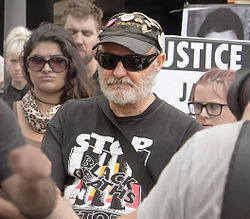Social justice’ is a term commonly used to describe notions of equality or access to equal rights for all members of a society.

Ray Jackson Aboriginal activist
Social justice is closely linked to the notion of human rights which we covered in Module 2 and will return to in the final week of this subject. Having access to equal rights is generally seen to include the right to good health and to live in health promoting environments, the right to a quality education and meaningful employment, equality before the law, the right to practice one’s culture, and the right to self-determination over one’s life. These rights might also be described as citizenship rights.
Australia as a nation has a history of promoting itself both domestically and internationally as an egalitarian society founded on the principles of democracy and social justice. In other words, a land in which all people, regardless of heritage or social circumstance, have equal access to society’s valued resources and rights, along with equal ability to achieve to their full potential. However, Indigenous Australians face disadvantage in all social indicators related to health, education, employment and criminal justice. This is a consequence of the ideology of ‘race’ and over two hundred years of economic, social and political marginalisation.
Thus, social justice has been described by the former Aboriginal and Torres Strait Islander Social Justice Commissioner, Professor Mick Dodson, as something which… must always be considered from a perspective which is grounded in the daily lives of Indigenous Australians. Social Justice is what faces you in the morning. It is awakening in a house with an adequate water supply, cooking facilities and sanitation. It is the ability to nourish your children and send them to school where their education not only equips them for employment but reinforces their knowledge and appreciation of their cultural inheritance. It is the prospect of genuine employment and good health: a life of choices and opportunity, free from discrimination (Annual Report of the Aboriginal and Torres Strait Islander Social Justice Commissioner, 1993, introduction).
Key Idea
Social justice’ is a term commonly used to describe notions of equality or access to equal rights for all members of a society.
Social justice is closely linked to the notion of human rights which we covered in Module 2 and will return to in the final week of this subject. Having access to equal rights is generally seen to include the right to good health and to live in health promoting environments, the right to a quality education and meaningful employment, equality before the law, the right to practice one’s culture, and the right to self-determination over one’s life. These rights might also be described as citizenship rights.
Australia as a nation has a history of promoting itself both domestically and internationally as an egalitarian society founded on the principles of democracy and social justice. In other words, a land in which all people, regardless of heritage or social circumstance, have equal access to society’s valued resources and rights, along with equal ability to achieve to their full potential. However, Indigenous Australians face disadvantage in all social indicators related to health, education, employment and criminal justice. This is a consequence of the ideology of ‘race’ and over two hundred years of economic, social and political marginalisation.
Thus, social justice has been described by the former Aboriginal and Torres Strait Islander Social Justice Commissioner, Professor Mick Dodson, as something which… must always be considered from a perspective which is grounded in the daily lives of Indigenous Australians. Social Justice is what faces you in the morning. It is awakening in a house with an adequate water supply, cooking facilities and sanitation. It is the ability to nourish your children and send them to school where their education not only equips them for employment but reinforces their knowledge and appreciation of their cultural inheritance. It is the prospect of genuine employment and good health: a life of choices and opportunity, free from discrimination (Annual Report of the Aboriginal and Torres Strait Islander Social Justice Commissioner, 1993, introduction).
Required Reading
The Australian Human Rights Commission explains the concept of social justice.
Content is available under the
Creative Commons Attribution Share Alike License.
Privacy Policy | Authors